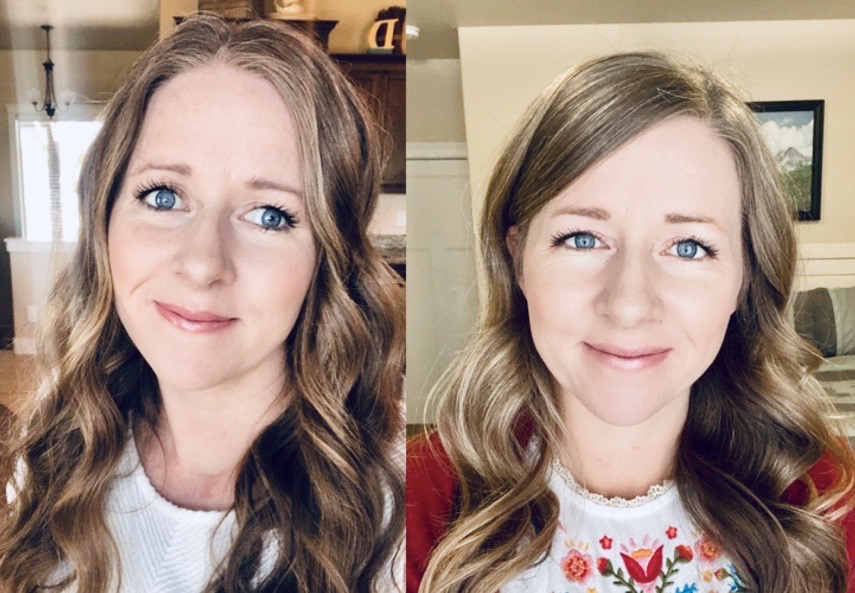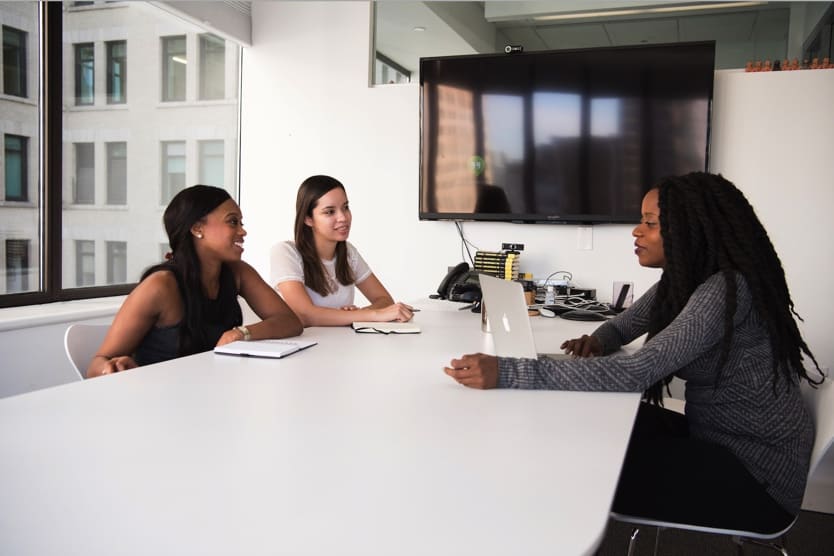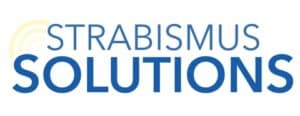When your eyes don’t point the same direction, meeting new people, especially during a job interview, can bring out anxiety, fear and overwhelm, but it doesn’t have to. I have been there and I have gotten every job I’ve applied for, let me share my secrets!
So how can you have an amazing interview, even if you have a lazy eye or eye turn? Prepare for the interview in all the typical ways; practice questions, printed resume, be early, dress for success, etc. Next, learn the tricks to make your eye turn less noticeable. Last, fuel your interview with positive thoughts and leave anxiety at the door.
Keep reading for specific tips on having a great interview and I will also answer some of your biggest questions/fears about interviewing with an eye turn.

If you want to know more about fixing your eye turn all together, I can help you figure out how. The process is different for everyone, but it is possible! Learn more about scheduling a consult with me below.
Cover the Basics
1. Learn About The Company and Position
Learn about the company, their philosophy and goals, and especially more about the position that you are hoping to fill. Are you a good fit? Why? How will the duties you’ve performed and skills you have add to the company and that specific position? Research and find answers to these questions and then bring it all up during the interview.
2. Practice Interview Questions
There are endless websites with mock interview questions and answers, my advice to you is to practice answering these questions, out loud with a real person, or just a picture of a person.
As a person with strabismus (eye turn, lazy eye, call it what you will), you probably have some issues with maintaining eye contact without thinking about your eyes so practicing this skill while answering interview questions is so beneficial! Just pull up a picture on your computer and practice!

3. Arrive Early
You already know this, but it is worth stating. My husband is in charge of hiring at his office and if the person is not on time for the interview, there is a very very low chance that they will make it to the final round of interviews.
4. Highlight Your Skills
You may be worried that the interviewer will wrongly assume that you aren’t as “with it,” smart or capable because your eyes aren’t straight. You might be right, but after you answer questions and showcase your abilities, they will quickly realize their mistake and focus on how you can be an asset to the company.
Let them see the good in you.
Make Your Eye-Turn Less Noticeable
Some people might try to tell you that nobody will notice your eye turn. But I’m not some people. They probably will notice and it might even be distracting, especially if you are maintaining good eye contact.
But there are tricks to make the turn less noticeable, and to ensure that you aren’t distracting from your amazing qualities. This will bring you more confidence and help the interviewer stay focused on what is important.
5. Make Eye Contact and Look at the Correct Eye
When making eye contact, be sure to look at the eye of the person that will de-accentuate your eye turn.
If your “lazy eye” goes too far to the left (either your left eye is exotropic or your right eye is esotropic), then you should look at the interviewers RIGHT eye.
If your “lazy eye” goes too far to the right (either your right eye is exotropic or your left eye is esotropic), then you should look at the interviewers LEFT eye.
This is subtle, but it will center the eye turn a little more and make your eyes look more even. If you don’t believe me, try taking selfies and use the same principle to look to the left or right of the camera, always look opposite of the way your eye goes.
You can see these principles displayed in some family pictures that were taken two years ago. The first picture is me looking straight ahead. In picture two, I tried to tilt my head and look to the side of the camera, but I overdid it and my eyes look even more off. In picture three I’m tilting my head ever so slightly and looking just to the side of the camera. My eye turn is still there, but it is much less obvious.



6. Angle Your Head or Body
This same principle applies to angling your body or head instead of facing the interviewer square on. You only need to angle very very slightly to make the turn less obvious, if you turn too much it goes the other way.
Just move your head or body very slightly in the same direction that your lazy eye goes.
These little movements can help you relax and know that your eye is not going to distract from the interview.
7. Breath Deep and Blink Often
You will likely be nervous, it is an interview, that’s completely normal. But don’t let it get out of hand. Take some deep breaths and be sure to blink often. Stress and anxiety can actually worsen your eye turn.
Breathing and blinking will help relax you and your eyes, which will actually make them look more straight. Don’t overthink this.
8. Smile
If you are smiling, happy, and confident, there is a good chance that the interviewer won’t even notice your eye turn, especially if you use my tricks. And even if they do notice, they won’t care. Employers are looking for positive, confident and reliable employees. Unless you’re looking to become a model, they aren’t going to care where your eyes are pointing.


Fuel Your Interview With Positivity
9. Think Helpful Thoughts
I hear people in the strabismus and lazy eye community worrying about job interviews quite often. Here are some of the things they are thinking and worrying about:
“Nobody will hire someone with a lazy eye”
“I hate interviews, employers think I’m disabled”
“I’m deformed”
“They aren’t going to see me…Just my eye”
“It’s incredibly embarrassing”
“I can’t tell when my eyes are straight”
“I struggle with interviews because they don’t know where I’m looking”
Sound familiar? I don’t know about you, but just reading that list makes me shrink in my chair and want to give up.
I think you already know the answer, but if your brain is swimming in all of that negativity, how do you think you’re going to come across in the interview?
You won’t be at your best, that’s for sure. You won’t appear to be confident and capable.
Instead, try on some of these thoughts. Some of them might resonate, others you may reject. Thoughts are like shoes, you have to try them on to make sure they fit.
“I am qualified for this job and I can’t wait to show them why.”
“They might notice my eye turn, and that’s okay.”
“I am prepared”
“3% of the population has an eye turn, it’s likely that this person personally knows someone with an eye turn and it won’t affect the interview at all.”
“I can learn how to be great at interviews, it just takes practice.”
Try being curious, instead of nervous:
“I wonder if I will be the perfect candidate for the job.”
“I wonder what my interviewer does for fun”
“I wonder how I can make this company even better.”
Being curious and positive can open you up to being a better listener, responder and overall interviewer.

10. Answer Your Brain
It is likely that your brain will suggest multiple “what if” questions that might send you to anxiety land. My suggestion is to simply answer your brain instead of spinning in emotion.
For example:
Brain: What if they ask me where I am looking???
You: I will answer honestly, “I have an eye condition called strabismus,” point to the good eye, “this is the eye that works correctly.”
Brain: What if they don’t give me the job because I have a lazy eye?
You: I can either file a complaint because that is against the law, or be grateful that I dodged working for a company that would not have treated me with respect.
Brain: There just aren’t enough jobs out there.
You: I only need one, and I will keep looking until I find it.
End Notes
Give me any profession and I will find a person in that profession with an eye turn, except perhaps those jobs that require perfect 3D vision like pilots and professional baseball players.
But you can find actors, actresses, authors, YouTubers, engineers, teachers, doctors, farmers, consultants, photographers and so many others that have strabismus or lazy eye.
It does not have to hold you back from reaching your full potential. You are so much more than your eye turn. Showcase the amazing parts of you.
If you are wanting to work on correcting your vision or straightening your eyes, the first step is to understand if and how your eyes are working together. You can take this free test that I created to help get started.
You can also book a consult with me and I’d be happy to help with the process!
